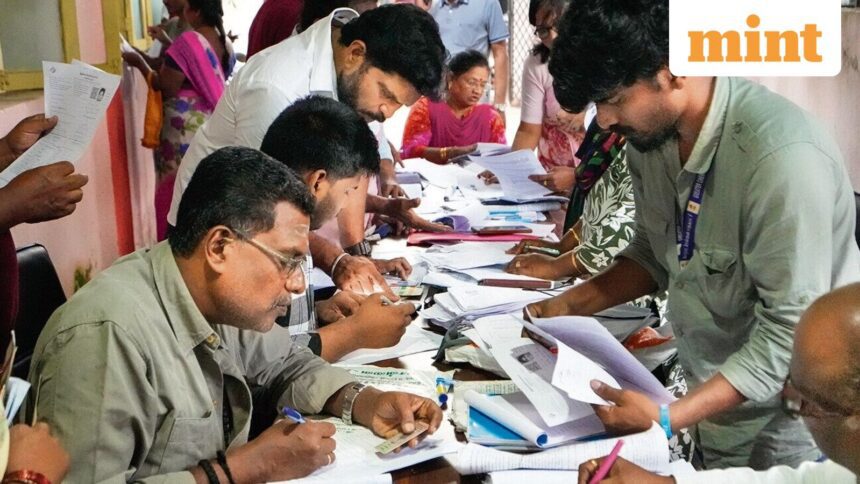Is there any reason why booth-level officers (BLOs) are receiving such negative attention, as the special intensive revision (SIR) of electoral rolls gains countrywide momentum?
Booth-level officers, particularly in opposition-ruled states like West Bengal, which is poll-bound, and Tamil Nadu, are reportedly under pressure primarily due to the `inhuman’ workload and `unrealistic’ deadlines associated with the Election Commission (EC) ongoing SIR of electoral rolls.
This situation has become a point of political contention, with ruling parties in these states accusing the ECI of creating chaos to potentially influence voter lists.
Says Prashant Bhushan, author and veteran public interest lawyer: “The BJP has a detailed list of voters who vote against it. The SIR exercise aims to eliminate all areas of dissent. The BLOs are being asked to work at a frantic pace so that the exercise is completed before anyone realises the damage being inflicted.’’
‘Deletion of nearly 47 lakh voters in Bihar’
Critics allege that the deletion of nearly 47 lakh voters in the recently concluded Bihar elections, described as the first round of voter cleanup, helped the NDA sweep the polls. They also say that while the deletion numbers in the Bihar voters’ list were made available, the numbers of voters who were added were never notified by the EC.
A political storm has erupted over the ongoing SIR of the electoral roll across 12 states and Union Territories, which was launched on November 4. Billed as the second round of voter clean-up, this exercise is scheduled to conclude on February 7, 2026, with the publication of the final electoral roll.
** Multiple deaths of BLOs have been reported in the past few days in Madhya Pradesh, Rajasthan, West Bengal and Kerala.
** Booth-level officers, engaged in the ongoing SIR process in West Bengal, scuffled with police personnel on November 24, while trying to enter the CEO’s office here during a demonstration to protest against alleged excessive work pressure.
*** Two teacher-cum-BLOs died of `illness’ in Raisen and Damoh districts of MP last week
*** The Noida administration in UP has registered FIRs against over 60 BLOs and seven supervisors across three police stations for alleged negligence and disobedience during the ongoing SIR of electoral rolls, while in Bahraich, two BLOs have been suspended on the same charges, and a third has been booked based on a BJP leader’s complaint.
Who is a BLO?
A BLO, according to a 2014 statement by the Election Commission, is a “local government/semi-government official, familiar with the local electors and generally a voter in the same polling area who assists in updating the roll using his local knowledge.’’
Your average BLO could be a teacher, anganwadi worker, or local body employee, who is assigned the additional duty of assisting the EC with grassroots-level work. Importantly, it is not a standalone or permanent job, but a crucial responsibility added to their primary professional duties.
A BLO’s main functions include, maintaining the electoral roll, ensuring it is accurate and error-free; house-to-house verification, voter registration assistance, form distribution and collection, voter ID (EPIC) distribution; offer election day support by being present at the polling station with the electoral roll to help voters, manage a help desk, and ensure pickup/drop facilities for senior citizens and persons with disabilities (PwD).
Onerous responsibilities, to say the least, considering that they have a lot on their plate.
BLO workers say excessive workload and tight deadlines – tasks that usually take several months or even years are reportedly being demanded within a few weeks – leading to `crushing’ pressure and employee protests.
In addition, there are technical and operational issues with BLOs reporting difficulties with the official app provided for data entry, citing slow servers, unresponsiveness, and data mismatch problems.
The intense pressure has led to reports of BLOs falling ill, and in some cases, multiple deaths by suicide have been reported, with suicide notes in some instances blaming the ECI for the `impossible situation’.
The timing of the SIR has also been cited as an issue, as it coincides with monsoon months, major festivals (like Christmas and Pongal), and harvesting seasons, making it difficult to find people at home for verification.
Added to this are concerns that the rushed process and ‘untraceable’ voters, due to rapid migration or other reasons, might lead to the incorrect deletion of names from the electoral rolls.
In response to these issues, BLO associations have staged protests and marches, demanding an extension of deadlines, a reduction in workload, and better support from the Election Commission. Two state governments, West Bengal and Tamil Nadu, have approached the Supreme Court regarding the matter.
According to the EC, for 50.97 crore voters in 12 states/UTs, it has deployed 5.32 lakh BLOs. This means one BLO has at least 956 electors to manage in a month.
The BJP has a detailed list of voters who vote against it. The SIR exercise is aimed at eliminating all such areas of dissent.
Former chief election commissioner TS Krishnamurthy says that part of the problem is that house-to-house verification – a critical component of SIR – has not taken place in the last 20 years. Now it is being enforced. He, however, believes that genuine concerns of the BLOs must be addressed by the EC. “It is true that during poll time, political parties tend to go overboard, and that tendency must be avoided.”
The trouble is India is perpetually in the election mode, as is the tendency for political parties to go overboard.










